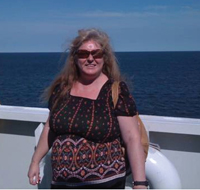April 18, 2013 — Pamela-Anne Kinney’s story of reducing the amount of her medication to control tonic-clonic seizures underscores the importance of people living with epilepsy having strong relationships with their doctors — and being advocates for their own health.

Kinney, 48, has been affected by seizures since she was 16, after being struck by a hit-and-run driver. Since then, the Kitchener, Ont. native has taken medications to control her seizures, but it wasn’t until she reduced her medication intake from 17 pills per day to two that she felt her quality of life improve.
How has changing her medication affected her life?
“I am not having any less seizures or any more, but I feel much better taking two pills a day, compared to 17,” Kinney says.
Having a doctor who listened to her concerns and helped wean her off the unnecessary medications another physician had prescribed helped give Kinney her life back. Before reducing her medication intake, Kinney says she felt like a “zombie.”
At one point in her journey, Kinney was down to seven pills per day, but still wasn’t feeling right. She went to see her family doctor to express her concerns that being on too many medications made her feel like her blood was poisoned. Her arms also felt extremely sensitive.
“I was lacking the correct medical terminology to express myself better, but my doctor had some blood work done to check things out,” Kinney recalls.
“She called me at home (at) about seven in the evening to tell me that I was right; that in a way my blood was poisoned because the anti-seizure meds I was taking were at toxic levels.”
Kinney has also made a point of keeping track of her seizures, which has helped keep her off medications. She began to notice patterns in her seizures — for example, they were higher during her menstrual cycle and when she lacked sleep or was stressed. She brought this to her neurologist’s attention. The neurologist thought the seizures during her cycle were caused by increased water pressure on her brain, so he prescribed Kinney water pills, which kept her seizure-free for two years.
While Kinney’s seizures have returned — water pills are not recommended for long-term use — she’s still feeling the benefits from taking fewer medications.
“I feel so much more alive today, compared to the time when I was a zombie,” she says.
“It has been a long journey to this point, but it has been well worth it. Who knows, maybe I will become totally drug-free, but if not that is OK too.”
If you have feedback on this story, or have a story of your own that you would like to share, please contact the newsroom at 800-294-0051, ext. 23, or e-mail deron(at)axiomnews.ca. You can also leave a comment below.
Writer: Deron Hamel
* If you wish to reprint this story, please include following notice: “This story originally appeared on the Epilepsy Ontario website.”





